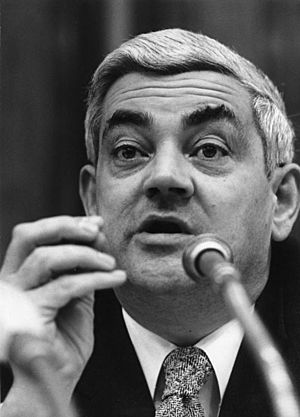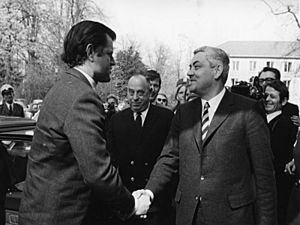Horst Ehmke facts for kids
Quick facts for kids
Horst Ehmke
|
|
|---|---|

Horst Ehmke in 1973
|
|
| Federal Minister of Justice | |
| In office 26 March 1969 – 22 October 1969 |
|
| Preceded by | Gustav Heinemann |
| Succeeded by | Gerhard Jahn |
| Chief of the Federal Chancellery | |
| In office 22 October 1969 – 15 December 1972 |
|
| Preceded by | Karl Carstens |
| Succeeded by | Horst Grabert |
| Federal Minister of Research, Technology, and Post | |
| In office 15 December 1972 – 7 May 1974 |
|
| Preceded by | Lauritz Lauritzen |
| Succeeded by | Kurt Gscheidle |
| Personal details | |
| Born |
Horst Paul August Ehmke
4 February 1927 Free City of Danzig |
| Died | 12 March 2017 (aged 90) Bonn |
| Political party | SPD |
| Occupation | Professor of law |
Horst Paul August Ehmke (born February 4, 1927 – died March 12, 2017) was an important German lawyer, professor, and politician. He was a member of the Social Democratic Party (SPD). He held several big jobs in the German government. These included being the Federal Minister of Justice in 1969. He also served as a top advisor, called the Chief of Staff, at the German Chancellery from 1969 to 1972. Later, he was the Federal Minister for Research, Technology, and Post from 1972 to 1974.
About Horst Ehmke's Life
Horst Ehmke was born in 1927 in a place called the Free City of Danzig. This city is now known as Gdańsk in Poland. He finished his high school education there. In 1944, when he was 17, he was listed as a member of the Nazi Party. However, when this information became public in 2007, he said he had not applied to join and did not know about it.
After World War II, many Germans had to leave their homes. Ehmke came to western Germany as a refugee. He went to college to study Law and Economics at the University of Göttingen. He also studied Political science and History at Princeton University in the United States from 1949 to 1950.
In 1952, he earned his doctorate degree in law. He passed his final law exams in 1956. During these years, he worked as an assistant for Adolf Arndt. Arndt was a member of the Bundestag, which is the German parliament.
From 1956 to 1960, Ehmke was part of the Ford Foundation. He worked for them in Cologne, Germany, and Berkeley, California. In 1960, he became a Professor of public law at the University of Freiburg. He later became the Dean of the law department there. From 1963, he held a special position as a full professor of law at the university. After 1974, he also worked as a lawyer.
Horst Ehmke was married and had three children. He passed away on March 12, 2017, at the age of 90.
Horst Ehmke's Political Career
Horst Ehmke joined the SPD in 1947. This is one of Germany's main political parties. He was an important member of the party's leadership from 1973 to 1991.
He was also a member of the Bundestag, Germany's parliament, from 1969 to 1994. He represented the state of North Rhine-Westphalia. In the Bundestag, he served as a deputy leader for the SPD group from 1977 to 1990.
Ehmke became the Federal Minister of Justice in March 1969. He held this job until October 1969. After that, he became the Chief of Staff at the German Chancellery. This meant he was a top advisor to Chancellor Willy Brandt from 1969 to 1972. During this time, he was also the Federal Minister for Special Affairs.
After the 1972 German federal election, he took on a new role. He became the Federal Minister for Research, Technology, and Post. He served in this position until May 1974.
Books and Writings by Horst Ehmke
Horst Ehmke wrote many books and articles during his life. Some of his earlier writings were about law and politics:
- Grenzen der Verfassungsänderung (1953)
- Politik der praktischen Vernunft – Aufsätze und Referate (1969)
- Politik als Herausforderung. Reden – Vorträge – Aufsätze 1968–1974 (1974)
- Politik als Herausforderung. Reden – Vorträge – Aufsätze 1975–1979 (1979)
- Beiträge zur Verfassungstheorie und Verfassungspolitik (1981)
- Mittendrin – Von der Großen Koalition zur Deutschen Einheit (1994)
After he retired from active politics, Horst Ehmke also started writing detective stories. These stories often had political themes:
- Global Players (1998)
- Der Euro-Coup (1999)
- Himmelsfackeln (2001)
- Privatsache (2003)
- Im Schatten der Gewalt (2006)
 | James Van Der Zee |
 | Alma Thomas |
 | Ellis Wilson |
 | Margaret Taylor-Burroughs |


